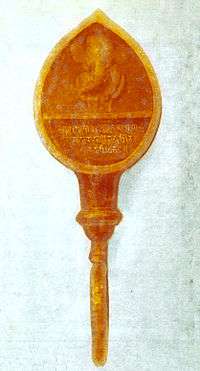Mlechchha dynasty
- For the ancient pejorative term for foreign people in India, see Mleccha
| Kamarupa Kingdom | |||||
| Mlechchha dynasty | |||||
| |||||
| Capital | Hadapeshvar (present-day Tezpur) | ||||
| Religion | Polytheism | ||||
| Government | Monarchy | ||||
| Maharajadhiraja | |||||
| • | c. 650 - c. 670 | Salasthamba | |||
| • | c. 815 – c. 832 | Harjjaravarman | |||
| • | c. 890 – c. 900 | Tyagasimha | |||
| Historical era | Classical India | ||||
| • | Established | 650 CE | |||
| • | Disestablished | 900 CE | |||
The Mlechchha dynasty[1] (c. 650 - 900) ruled Kamarupa from their capital at Hadapeshvar in the present-day Tezpur, Assam, after the fall of the Varman dynasty. The rulers were aboriginals (local clan, genetically non-diverse), though their lineage from Narakasura was constructed to accord legitimacy to their rule. According to historical records, there were twenty one rulers in this dynasty but the line is obscure and the names of some intervening rulers are not known. The Mlechchha dynasty in Kamarupa was followed by the Pala kings.
Rulers
 |
|
Rulers of Varman Dynasty (350 to 650 CE)
|
|
Rulers of Mlechchha Dynasty (650 to 900 CE)
|
|
Rulers of Pala Dynasty (900 to 1100 CE)
|
|
Major Events
|
- Salasthamba (650-670)
- Vijaya alias Vigrahastambha
- Harshadeva alias Harshavarman (725-745)
- Balavarman II
- Salambha[2]
- Harjjaravarman (815-832)
- Vanamalavarmadeva (832-855)
- Jayamala alias Virabahu (855-860)
- Balavarman III (860-880)
- Tyagasimha (890-900)
Notes
- ↑ Though mlechchha is a derogatory word, Harjaravarman, a king of this dynasty explains the term (though illegible) in the Hayunthal copper plates (Sharma 1978:91).
- ↑ Pralambha, read from the Tezpur plates, can be corrected to Salambha, in light of the Parbatiya plates, (Sarma 1978, p. 105)
References
- Bhattacharjee, J. B. (1992), "The Kachari (Dimasa) state formation", in Barpujari, H. K., The Comprehensive History of Assam 2, Guwahati: Assam Publication Board, pp. 391–397
- Sharma, M M (1978), Inscriptions of Ancient Assam, Guwahati: Gauhati University
- Sircar, D. C. (1990), "The Mlechchha Dynasty of Salasthambha", in Barpujari, H. K., The Comprehensive History of Assam 1, Guwahati: Assam Publication Board
This article is issued from Wikipedia - version of the Thursday, October 22, 2015. The text is available under the Creative Commons Attribution/Share Alike but additional terms may apply for the media files.